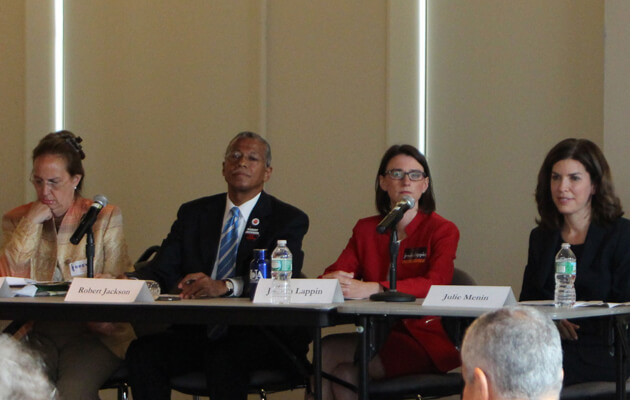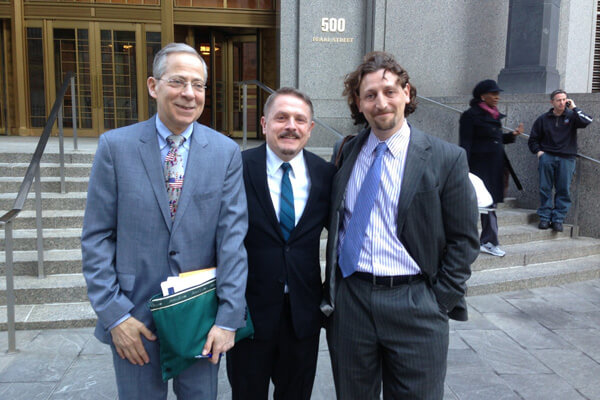Manhattan borough president candidates Gale Brewer, Robert Jackson, Jessica Lappin, and Julie Menin at an August 7 debate at NYU. | KAITLYN MEADE
“Education, jobs, affordable housing” was the mantra that candidates for Manhattan borough president stuck to at a recent debate on the campus of New York University. All four Democratic candidates appeared comfortable in their skins at the August 7 event, settling in for what one of them called their 538th debate in advance of the September 10 primary.
Limiting development was also an underlying current throughout the debate.
Upper West Side City Councilwoman Gale Brewer, who emphasized the need to combat overcrowding in public schools, also said building libraries and parks needs to be a priority. She noted the New York Times had cited her as one of the top five city officials championing parks.
Councilman Robert Jackson, who represents Manhattan’s West Side north of Brewer’s district and co-chairs the Council’s Black, Latino and Asian Caucus, focused on job creation. Noting his constituents suffer from some of the highest unemployment rates in the borough, he said he was committed to ensuring “that Manhattan stays affordable.”
“What I would like to do is very simple,” Upper East Side Councilwoman Jessica Lappin said. “Fight for middle class and working people in this borough with a special emphasis on tenants and seniors.” Lappin talked about employing “bottom-up planning” to look at things 10 to 15 years down the road so that the necessary infrastructure can be built to keep up with development.
Throughout the debate, former Lower Manhattan Community Board 1 chair Julie Menin came back again and again to her plan for a “comprehensive, borough-wide master plan” as a critical tool for addressing the borough’s problems. The plan, she explained, would mandate standard minimum infrastructure and funding contributions — for pubic benefits including schools and affordable housing — on all developers.
“I am running for borough president because I believe we need to completely reform our land use review process,” Menin said in her opening statement, sparking the first spontaneous applause at the session.
The most lively audience reaction came when the topic of the Council’s 2012 approval of NYU’s expansion came up during a question about the candidates’ views on both that and the fast-tracked proposal to develop skyscrapers in Midtown East. “We’re sitting in a neighborhood where the City Council and the mayor approved rezoning,” Dick Dadey, executive director of the government watchdog group Citizens Union and one of the evening’s moderators, noted in his question.
The topic prompted a round of finger-pointing as the City Council members attempted to distance themselves from the final deal. Brewer reminded the audience that everyone on the Council but Charles Barron, a Brooklynite who often goes it alone, voted for the expansion in the end. She went on to say she did not agree with the terms set and would have taken a different posture had she been borough president at the time.
Jackson similarly voiced doubts about the final agreement, squarely pointing his finger at Lower Manhattan Councilwoman Margaret Chin, who acted as the lead Council negotiator. “You should know it’s not an open and transparent process because negotiations don’t take place in public, they happen in private,” he said.
Lappin also turned the blame on Chin, saying, “I was not the prime negotiator. I think I would have done a better job. I would’ve handled it differently. I would have worked with the local elected officials, for example. But in the end, I voted as the current borough president suggested. I voted in favor of the plan.”
Menin spoke about her efforts to lobby NYU to expand into Tower 5 of the World Trade Center site, though such a move would not have replaced the massive Bleecker Street tower. She used the expansion as an example of why land use review procedures are in need of reform through her master plan.
Candidates cranked up the pressure on each other a notch when given the opportunity to ask one question of a randomly selected opponent.
Jackson was asked by Menin about the City Council’s vote to overturn term limits, which gave both him and Mayor Michael Bloomberg eligibility for a third term despite two voter referendums that limited tenure to eight consecutive years. Jackson pointed out that in Manhattan those referendums did not enjoy majority support. He also cited the lack of voter turnout as a factor in the mayor winning a third term, saying, “I didn’t cut the deal. The people of New York voted, 1.5 million voted out of 4 million. Those people that did not vote gave Mayor Bloomberg another term, not me.”
On another issue that sparked the audience’s vocal response, Menin was asked by Lappin why she “chose to become a Republican during George W. Bush’s term.” Menin, who briefly abandoned her Democratic Party registration between 2001 and 2003, said that after 9/11, “I would do whatever I could to work for the community and make sure the community had a voice at the table,” pointing out the need to work with the Republican administration of Governor George Pataki. Noting her advocacy of the Ground Zero mosque and her good relations with the Occupy Wall Street encampment, she insisted she has always been a progressive.
Jackson’s query of Brewer proved less challenging, perhaps unintentionally, when he asked about her position on small businesses, a question she said she “loved” because of legislation he steered through the Council to allow her district to restrict the street frontage size of incoming banks in an effort to preserve space for mom-and-pop shops.
Brewer passed on the love to Lappin, her seatmate in the City Council and apparently also her gossip buddy, who was asked simply to elaborate on her experience outside of her eight years on the Council. Lappin, however, doubled down on her work in city government, noting she had spent the years prior to her election on the staff of her predecessor in her district, Speaker Gifford Miller.
“I made a decision when I graduated college that making money was not as important as making a difference,” she said.
Menin was the only candidate to advocate “absolutely” for a City Charter revision to give both the borough president and community boards greater binding authority. Jackson and Lappin both said that a Charter Revision Commission could yield good results, though Jackson added, “But the bottom line is this is what we have. You have to follow the law, and within a certain time you have to act.”
Brewer noted that a number of such commissions called by Bloomberg have yielded few results. She said the new mayor next year will have a crucial impact on the value of any Revision Commission.
“The Charter change must include the way the City Council, the community boards, and the borough president and the mayor all work together,” she said.
The debate was organized by Citizens Union, a government watchdog group, NYC Community Media, the parent company of Gay City News, and NYU, which hosted the event at its Center for Academic and Spiritual Life. Citizens Union’s Dadey was joined by Gay City News editor-in-chief Paul Schindler in moderating.














